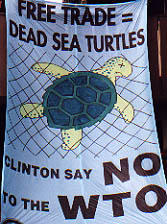The
plans of both governments, which had promised to join the WTO by
December 2005, did not look very realistic from the beginning. But the
bureaucrats in Moscow and Kiev frightened critics off, swearing up and
down that they would complete the negotiations in time for the Hong
Kong summit. Naturally, people started lobbying away furiously for
their special interests. But since the interests of all branches of the
economy (except the export of gas and oil, and possibly of metals) are
irreconcilable with membership in the WTO, the position of the official
negotiators became difficult in the extreme.
For they not only would have to sell their own populations down the
river (which wouldn't bother anybody in Russia or Ukraine, Orange
Revolution or no), they also would have to give over the majority of
their entrepreneurial classes, including foreign investors who have
already put money into doomed industries.
Whenever Russian membership in the WTO comes up, people mention the
automobile industry, no doubt because its representatives have been the
most vociferous in expressing their views on the government's plans.
And of course, everybody notes right off that under the long-standing
protectionist policies, the owners of the auto factories simply did not
learn to make good cars. The famous Volga is going out of production,
and the Lada gets progressively worse and more expensive as the years
go by. Yet people forget that the national auto industry has not
consisted simply of Volgas and Ladas for a very long time now. There
are Fords from the Leningrad region, Hyundais from Taganrog and a whole
series of other brand names whose cars have been assembled in Russia
for some time, just as the Ukrainians have been assembling Daewoos.
A side effect of the protectionism was that foreign corporations were
forced to develop their production in Russia. If the protectionist
policy is retained, the production of automotive component parts will
also be expanded. But the opening of these markets would spell doom for
such plans.
What's happening with Russia's and Ukraine's WTO membership is only one
aspect of a larger crisis within that organization, a crisis which
makes the violent protests of the South Korean farmers in Hong Kong
seem no more than a minor irritation.
The WTO's crisis is systemic. It is entirely clear that the
organization needs to change course, that the policy of liberalization
and deregulation has reached a dead end and that continuing it will not
be profitable even for those countries that pushed it through in the
first place. The Western nations understand perfectly that opening
their agricultural markets would lead not only to the disappearance of
farming but also to a whole chain of ecological and social disasters
well outside the agricultural sector. Thus, despite the small relative
weight of the farmers in the general population, their interests are
aggressively defended in both Europe and the United States.
Many Third World countries nevertheless continue to demand the opening
of Western markets, seemingly by inertia. The governments in question
are merely faithfully following the recommendations of their U.S. and
European teachers. But in practice, the strengthening of export
orientation in weakly developed economies brings them even more trouble
than it does the West. The greater part of the agricultural population
does not gain from developing exports. On the contrary, the position of
the transnational agribusinesses is strengthened at the expense of
local rural populations. Unemployment rises, internal markets are
disrupted, and the economic crisis deepens. The sole answer is to let
the West retain its protectionism, but with the condition that
everybody else gets the right to defend their own markets too.
As always happens with failed policies, the costs associated with their
continuation exceed the benefits many times over. The WTO's steering
wheel needs to be turned in the opposite direction, but structures of
this kind are simply incapable of doing that. They are doomed because
they were "imprisoned" by the strictures of a single task -- the
liberalization of markets in this instance -- and they do not have the
minimal flexibility necessary to react either to the demands of society
or even to the needs of a fairly large portion of the Western elites.
Boris Kagarlitsky is director of the Institute for Globalization Studies.
http://www.themoscowtimes.com/stories/2005/12/22/009.html
 Boris Kagarlitsky
Boris Kagarlitsky